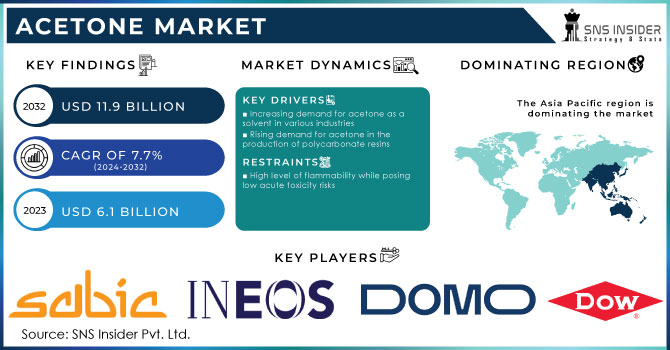The global acetone market is set to experience sustained growth over the next several years, driven by the expanding demand for acetone in industries such as pharmaceuticals, automotive, chemicals, and consumer goods. As one of the most versatile solvents in the chemical industry, acetone plays a critical role in a wide range of applications, including coatings, adhesives, and plastics, positioning it as a key chemical in modern manufacturing processes.
Acetone’s ability to act as a solvent for cleaning, degreasing, and thinning products, coupled with its use in the production of high-performance materials, is fueling its growing demand across various sectors. With rising industrial applications and continuous advancements in product formulation, the acetone market is well-positioned for growth in both established and emerging markets.
The Acetone Market Size was valued at USD 6.1 billion in 2023, and is expected to reach USD 11.9 billion by 2032, and grow at a CAGR of 7.7% over the forecast period 2024-2032.

Key Market Drivers:
- Pharmaceutical Industry Demand: Acetone is widely used in the pharmaceutical industry for the production of various drugs and in the extraction of active ingredients. The increasing demand for pharmaceutical products, including vaccines, analgesics, and cosmetics, is driving acetone usage. Additionally, acetone is utilized in the production of sterile preparations and in drug formulation processes.
- Automotive and Coatings: Acetone plays an essential role in the automotive industry, particularly in the production of coatings, paints, and adhesives. Its ability to serve as a solvent in coatings, helping to achieve smooth finishes and rapid drying times, is making it an indispensable ingredient in automotive refinishing and maintenance. The growing automotive sector, with an increased focus on vehicle aesthetics and durability, is expected to continue driving acetone consumption.
- Chemical Manufacturing: As a key solvent in chemical processes, acetone is widely used in the production of plastics, polymers, and synthetic fibers. It is also a vital component in the production of methyl methacrylate (MMA), which is used in acrylic plastics. The increasing demand for these products across various industries is fueling the acetone market.
- Consumer Goods and Household Products: Acetone is commonly used in the manufacturing of personal care products, household cleaners, and nail polish removers. With growing consumer demand for high-quality personal care products and cleaning agents, the demand for acetone in the consumer goods sector is expected to remain robust.
Key Applications:
- Solvent in Coatings and Adhesives: Acetone is widely used as a solvent in paints, coatings, and adhesives due to its excellent solubilizing properties. It enables easy application, smooth finishes, and quick evaporation, making it an ideal choice for automotive, construction, and industrial coatings.
- Pharmaceutical Manufacturing: Acetone is used in the pharmaceutical industry for drug extraction and synthesis. It also acts as a solvent in pharmaceutical formulations, helping to produce effective and high-quality medical products.
- Plastics and Synthetic Materials: Acetone is used in the production of plastics and synthetic materials, particularly in the creation of acrylics, polycarbonates, and epoxy resins. As the demand for these materials continues to rise, particularly in industries like construction, automotive, and electronics, the use of acetone is expected to increase.
- Consumer Products: Acetone plays an essential role in the formulation of personal care products, including nail polish removers and cosmetics. It is also used as a cleaning agent in household products, contributing to the continued growth in demand from the consumer goods sector.
Market Trends:
- Sustainability and Green Chemistry: As industries increasingly prioritize environmental sustainability, there is a growing demand for green chemicals and processes. Manufacturers are focusing on creating more eco-friendly acetone production methods, such as bio-based acetone, derived from renewable feedstocks. This trend aligns with the global shift toward sustainability and reducing reliance on fossil-based chemicals.
- Technological Innovations in Production: Technological advancements in acetone production processes, including more efficient and cost-effective methods, are expected to boost market growth. Enhanced production techniques and optimization of raw material usage can help meet rising demand while keeping production costs competitive.
- Emerging Markets: Rapid industrialization and urbanization in emerging economies, particularly in Asia-Pacific, Latin America, and the Middle East, are contributing to the increased demand for acetone. Growing manufacturing sectors, along with the rising consumption of consumer goods and automotive products, are creating new opportunities for acetone producers.
Key Players
· INEOS Phenol GmbH
· SABIC
· The Dow Chemical Company
· Domo Chemicals GmbH
· Formosa Chemical and Fiber Corporation
· Kumho P&B Chemicals
· Royal Dutch Shell PLC
· Honeywell Research Chemicals
· Spectrum Chemical Mfg. Corp.
· Altivia Chemicals
Conclusion:
The acetone market is poised for continued growth, driven by its critical role in pharmaceutical manufacturing, automotive coatings, consumer goods, and chemical processes. As industries evolve and seek higher performance, sustainability, and efficiency, acetone will remain a vital component in the production of a wide range of materials. The trend toward greener production methods, coupled with technological advancements in production efficiency, is expected to further enhance the market's outlook. With increasing demand across diverse applications and emerging markets, acetone is set to continue playing a central role in the global chemicals market.
For more details @ https://www.snsinsider.com/reports/acetone-market-3703
Contact Us:
Akash Anand – Head of Business Development & Strategy
info@snsinsider.com
Phone: +1-415-230-0044 (US)









